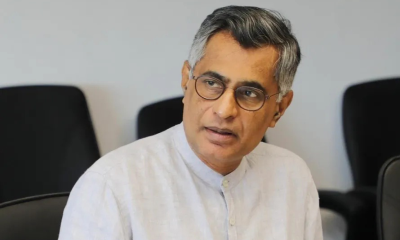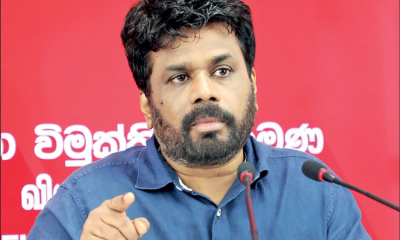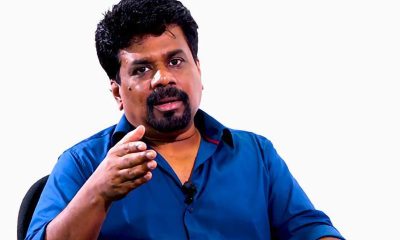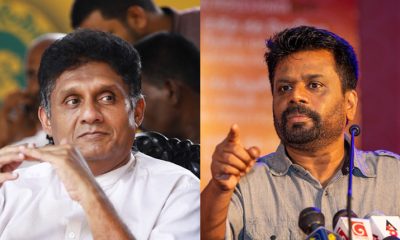Editorial
What will the New Year bring?

This being the last issue for 2023, we take the opportunity of wishing all our readers a very Happy New Year. But not even the most optimistic among us would say that all Sri Lanka’s troubles have been packed up in the old kit-bag and there is reason to “smile, smile, smile” as the New Year beckons. The aragalaya-fuelled trauma of the previous year that loaded the worst ever travails in our contemporary history on the backs of the people had, no doubt, tailed off in the year now passing.
But the end of miles-long fuel queues, ever present search for cooking gas and a host of woes that made 2022, the last months of the Gotabaya Rajapaksa presidency, and one that saw the banishing of the Rajapaksas to a perceived political wilderness did not play out this year as may have been expected. Many termites are now crawling out of the woodwork, looking at the elections that must be held next year.
The people are very well aware that the respite they won in 2023 was largely due to the country not servicing its debt and falling back on repayment of its domestic and international obligations. Although our rulers trumpet that inflation is down to a single digit, any housewife stepping into a market knows all too well that the cost of living is unbearable.
True, upscale restaurants and the big hotels are crowded by the affluent not lacking in this so-called democratic socialist republic of ours. That has always been the case given the grave income disparities that have beset this island before and after Independence. Our notorious penchant for ‘clean suit, empty pocket’ lifestyle has been widely on display with the capital city of a country that not long ago declared itself bankrupt when Colombo was lavishly decorated with power guzzling illuminations. And this while tens of thousands of domestic electrical connections have been disconnected due to non-settlement of bills.
We step into the New Year with trepidation knowing that with the increased value added tax (VAT) hard-pressed domestic budgets are going to be further burdened. A small carrot has been dangled before the people saying that the unseasonal rainfall of an unusual magnitude, enabling the Ceylon Electricity Board to generate much of the country’s power requirements with hydro resources that have bult-up in the power generating reservoirs, may enable some respite to hard-pressed consumers.
But most would await the formal announcement or the receipt of the next bill before heaving a sigh of relief. We are now in an IMF program demanding the end of the country’s habitual financial profligacy and decades of deficit budgeting. A respected economist is on record describing the 2024 budget which passed through all its stages last November and December as a “fairy tale.” The rulers have provided good reason over the years for the country to accept this proposition.
President Ranil Wickremesinghe is on firm record that due elections will be held as constitutionally mandated next year. But he is playing his hand very close to his chest on which election will come first – presidential or parliamentary. As is well known, then Prime Minister Wickremesinghe was elected by Parliament, or rather its pohottuwa majority, to serve out Gotabaya Rajapaksas balance term.
This ends in November and a new president must be elected by then. For this to be possible, the election machinery must begin to move by September with an election declared, nominations called and received etc. But Wickremesinghe holds the power of dissolving the incumbent Parliament at any time he wishes although its term extends to August 2025.
Predictions on what he may or may not do abound. There are those who say that holding a parliamentary election while he is enthroned in the presidency will be a distinct advantage for the UNP which Wickremesinghe is committed to revive. This after he led it to zero elected seats, including his own, at the last election.
But there are many other considerations. Among them, will RW be a runner for an elected presidency? He has yet made no formal announcement but the wide perception countrywide is that he will seek an elected term. The Rajapaksa party which elected Wickremesinghe to office is not saying that Ranil is their candidate at the next presidential election.
Yet it insisted at their recent convention in Colombo that they will run a candidate stopping short of naming him or her. The pohottuwa says it is considering business tycoon Dhammika Perera, 59, it brought into on its national list to Parliament in 2022 succeeding Basil Rajapaksa. Perera, whose DP (Dhammika and Priscilla) Education is reaching out countrywide to a claimed over million young people given a free information technology (IT) education, has indicated interest and is projecting himself through newspaper advertising of his pet project.
He retains a very low profile in Parliament having hardly spoken there after entering the legislature. He served a brief two months as investment promotion minister since his 2022 entry to Parliament and has since been a barely visible backbencher.
In terms of whatever opinion polls that exist, the JVP’s Anura Kumara Dissanayake, leading the National People’s Power (NPP) seems to be the leading contender with Sajith Premadasa trailing him. But as is well know, such polls are only as good as their sample cross section of the population and cannot be considered reliable indicators. Remember Mahinda Rajapaksa engineered a constitutional amendment in 2010 to enable a third term for himself and lost the 2015 presidential election to the common opposition candidate Maithripala Sirisena. It’s early days yet and much can happen.
Editorial
Politics, garbage and pillow fights

Friday 1st November, 2024
The ongoing US presidential race has got down and dirty so much so that trash and garbage trucks have been dragged into the propaganda war between the Republicans and the Democrats. The two sides are attacking each other, according to Rafferty’s rules. On Sunday, a comedian who spoke at a Republican rally happened to remark that US territory of Puerto Rico was a ‘floating island of garbage’ and unwittingly provided grist to the propaganda mill of the Democrats.
But two days later, President Joe Biden, true to form, made a gaffe; he said Trump supporters were garbage, and the Republicans seized on it to launch a massive counterattack, with Donald Trump going to the extent of travelling in the cabin of a garbage truck to a campaign rally, and condemning the Democrats, who provided the Republicans with a new line of attack and a rallying point.
Gimmicks and rhetoric have come to dominate the US presidential contest, and the garbage drama, as it were, has eclipsed many vital issues, especially the staggering human cost of brutal Israeli attacks on Gaza, and the US complicity in the humanitarian tragedy. It is also doubtful whether Trump and his main rival, Kamala Harris (D), have paid much attention to the war between Russia and NATO being fought in Ukraine. Perhaps, why they are not intensely focused on the economy is understandable.
The US economy is reportedly in good shape; the growth rate is satisfactory and the unemployment rate is low. This may be the reason why the presidential candidates have chosen to flog other issues hard, but according to some opinion survey results, about 80% of the American voters prioritise the economy over everything else, and they may not be happy with the Republican and Democratic campaigns.
Whether Trump’s garbage truck gimmick will yield the desired result or whether the US public will relegate him to the dumping chamber of that vehicle in the upcoming presidential election remains to be seen. The possibility of Harris facing a similar fate cannot also be ruled out, given the anti-incumbency sentiments, Biden’s endless gaffes, Democratic bungling and the intensity of the Republican propaganda onslaught.
Meanwhile, in Sri Lanka, which is going to the polls in less than two weeks to elect a new Parliament, the focus of the candidates and their leaders has shifted from the ailing economy to other issues; polemics, rhetoric and mudslinging have taken precedence over logical reasoning. In the run-up to the September presidential election, all parties vied with each other to make the highest number of promises, such as pay hikes, tax reductions, subsidies and anti-corruption campaigns in a bid to garner votes; now, they are making even more promises which, if implemented by any chance, would send the economy into a tailspin again.
A ding-dong between former President Ranil Wickremesinghe and some NPP leaders, especially President Anura Kumara Dissanayake and Prime Minister Harini Amarasuriya, has overshadowed the key issues that political leaders should address ahead of a general election. Wickremesinghe keeps teasing the NPP bigwigs by claiming that he is a former President without a majority and Dissanayake is an incumbent President without a majority, and offering to give lessons to the PM on the Constitution. The NPP has turned on Wickremesinghe, but one wonders whether their battles are like scripted wrestling matches; they look more like pillow fights than typical vicious attacks that Sri Lankan politicians are notorious for.
The NPP and the UNP cannot be so hostile towards each other, for it was a split caused by Wickremesinghe in the anti-NPP vote, in the recently-concluded presidential contest, that enabled Dissanayake to secure the presidency. Following its victory in the presidential race, the NPP may have thought that the upcoming parliamentary election would be a walk in the park, but it has become a trudge through a marsh, so to speak. The current battle between the UNP-backed New Democratic Front and the SJB for anti-government votes will also benefit the NPP, which may be able to obtain bonus seats by winning electoral districts.
It is one’s fervent hope that whatever the outcome of the upcoming general election may be, all political dregs in the fray will be given a garbage truck ride to the landfill of politics, where they belong.
Editorial
Hope giving way to despair?

Thursday 31st October, 2024
Some studies have been conducted on the ill effects of the current economic crisis on the physical well-being of Sri Lankans. They have revealed an increase in malnutrition, especially among children. However, no such comprehensive study has been carried out to ascertain mental health issues caused or aggravated by the economic crisis and the resultant socio-political problems.
A study published in Nature has revealed that brain networks differ in people battling depression, and a special brain network (‘salience network’) ‘is expanded nearly twofold in the cortex of most individuals with depression’. There is reason to believe that the average Sri Lankan’s salience network must be much larger.
There are signs of the spring of hope Sri Lankans looked forward to, before last month’s presidential election, turning out to be a winter of despair. Some issues identified as forefront policy concerns have gone unaddressed, one being the high prices of essentials owing to market manipulations.
The argument that it is not fair to expect an interim government to tackle serious issues swiftly is not without some merit, but hasn’t the NPP administration undertaken to solve emblematic criminal cases, find out the mastermind/s behind the Easter Sunday carnage and trace the stolen public funds lying in offshore accounts? For an interim administration that is confident of accomplishing such gargantuan tasks, bringing the prices of essential food items down should be child’s play. After all, it does not require a parliamentary majority or a mega Cabinet to lower the prices of commodities such as rice, eggs and coconuts.
The Consumer Affairs Authority (CAA) is currently awake and doing its utmost to justify its existence. Some of its officials recently visited the warehouse complexes of some large-scale rice millers blamed for the current artificial shortage of rice. They were shown on TV interviewing the millers and their aides, who gave evasive answers and obfuscated the issue of shortage of rice and high prices. This hare-brained approach exemplifies a popular local saying, which roughly rendered into English means ‘seeking the help of a female clairvoyant to catch a thief who happens to be her own son’. The government is tracing its rivals’ hidden vehicles, but it cannot detect the stocks of illicitly hoarded paddy! No wonder the people are troubled by frequent episodes of depression, and their anger is welling up.
Moreover, the new dispensation’s handling of accountability issues does not hold out much hope. Instead of inquiring into the findings and recommendations made by a presidential probe committee, in respect of two retired police officers catapulted to high posts in the public security sector, the government has chosen to vilify Udaya Gammanpila, who released the committee report at issue and the former judge, A. N. J de Alwis, who headed the committee. Regardless of the serious allegation that the two officers failed to prevent the Easter Sunday terror attacks, the government has said it will not remove them under any circumstances and the Easter Sunday tragedy will be probed afresh under their supervision.
Gammanipila has also made public the report of the presidential committee, which probed the Channel-4 allegation that a section of the Sri Lankan military intelligence was involved in the Easter Sunday attacks. The committee headed by former Supreme Court judge S. I. Imam has dismissed the Channel-4 claims as baseless, according to Gammanpila, who has also alleged that ‘a former high-ranking police officer currently in a top position in the public security sector’ collaborated with Channel-4 to tarnish the image of the country. He has stopped short of naming the officer, but if his claim is true, and the ‘officer’ concerned is involved in the fresh probe into the Easter Sunday terror attacks, the integrity of the investigation will be compromised. Now, besides the ongoing probe to find out the Easter Sunday carnage mastermind/s, another investigation will have to be launched to identify the ‘officer’ who made false allegations against the military intelligence.
The people’s depression and resentment, which is palpable, have the potential to turbo boost the rising wave of anti-politics. The outcome of the recently-concluded Elpitiya Pradeshiya Sabha election points to the people’s growing disillusionment with the self-proclaimed messiahs of all political hues.
Editorial
New electoral system benefited NPP

Wednesday 30th October, 2024
The current mixed proportional electoral system—a combination of the first-past-the-post and proportional representation (PR) systems—under which the local government elections are held, is in the spotlight again following the outcome of the Elpitiya Pradeshiya Sabha (PS) election held last Saturday (26).
The JVP-led NPP obtained 15 seats but failed to secure a working majority in the PS as the Opposition political parties and the independent group in the fray also obtained 15 seats. The two sides are now evenly balanced. It will be interesting to see whether the NPP secures the backing of some Opposition members it has condemned as undesirables.
Obviously, the NPP, which had won the presidential election only about four weeks before, expected a better result on Saturday. In 2019, the SLPP, as an Opposition party, was able to win 17 out of 29 seats in the Elpitiya PS. In 2002, the JVP itself won 06 seats in the Tissamaharama PS as opposed to the ruling UNP’s 04 seats and the SLFP-led PA’s 02 seats; in other words, it won against the UNP led by Prime Minister Ranil Wickremesinghe and President Chandrika Kumaratunga’s People’s Alliance. Today, the JVP-led NPP is in power!
The new electoral system has come in for criticism, and prominent among its critics is the NPP, which says it has distorted the people’s decision in Elpitiya. JVP/NPP stalwart, K. D. Lal Kantha, has condemned the mixed proportional system in public, demanding urgent action to change it. He is entitled to his opinion, and he is not alone in demanding electoral reforms at the local government level, but the NPP’s argument against the current mixed proportional system is self-defeating.
An analysis of Saturday’s Elpitiya PS election results shows that the NPP would have been able to secure only 13 seats in the local council if the election had been held under the previous PR system. It benefitted from two overhang seats; it was able to win 15 out of 17 seats on the ward basis under the first-past-the-post system. Overhang seats arise when a party or a group happens to obtain seats in excess of what it is entitled to under the PR system. If one divides the NPP’s votes by the qualifying number, one will see that the NPP was entitled to only 13 seats, but it could retain all 15 seats it won on the ward basis. If the election had been conducted under the PR system, the number of members elected to the Elpitiya PS would have been 28 and not 30 (28+02 overhangs), and the Opposition would have obtained 15 out of those 28 seats. Such an electoral setback would have landed the NPP in deep trouble, with a general election to be held next month.
The next parliamentary election will be held under the PR system, and the NPP will have to improve its electoral performance significantly if it is to obtain a majority. Former President Ranil Wickremesinghe predicted recently that the next Parliament would be hung. Interestingly, a few days after his prediction, the Elpitiya PS became hung! There are others who are prognosticating the likelihood of a hung parliament, on the basis of the results of last month’s presidential election. Whether the NPP will be able to prove them wrong remains to be seen.
The need for a radical rethink about the mixed proportional system cannot be overstated. It is in practice in some other countries, such as Germany, but those who introduced it here blundered by causing the number of local councillors to increase exponentially. Some half-hearted efforts have since been made to change it, but mini polls continue to be held under it. If electoral reforms are to be introduced, that will have to be done after the conduct of the next countrywide local government elections.
-

 Sports5 days ago
Sports5 days agoPassing the torch; Sri Lanka’s next batting dynamos
-
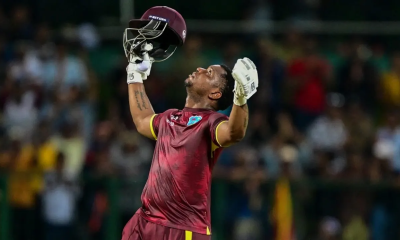
 Latest News5 days ago
Latest News5 days agoLewis’ 61-ball century trumps Kusal’s 19-ball fifty in 23-over shootout
-
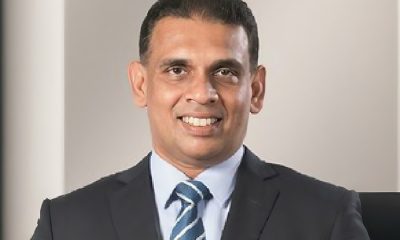
 News4 days ago
News4 days agoNo immediate drop in tourist arrivals – tour operators
-
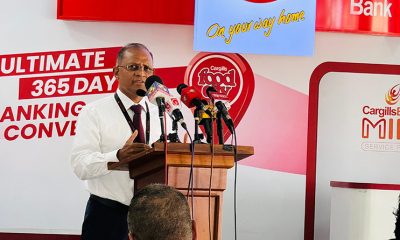
 Business4 days ago
Business4 days agoCargills Bank expands banking convenience to 51 new Cargills supermarkets
-
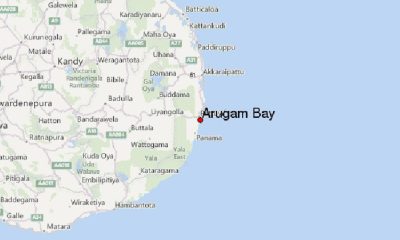
 Features4 days ago
Features4 days agoIsraelis in Sri Lanka and Advent of a ‘Neo’ Colonialism
-

 Sports6 days ago
Sports6 days agoSri Lanka plan early departure to South Africa
-
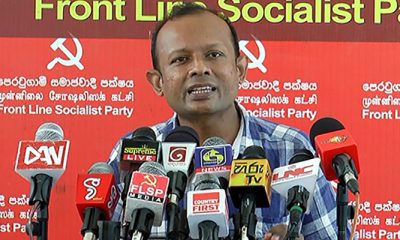
 News4 days ago
News4 days agoGovt. urged to probe questionable passport deal, save state funds
-

 Features3 days ago
Features3 days agoRestructuring education to align with global demands




